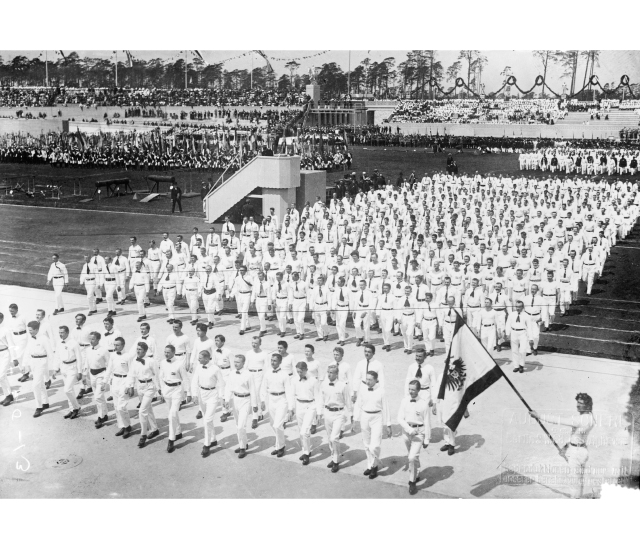Did you know that the sixth summer games of the modern Olympics was due to be held in Berlin in 1916? However, the ongoing fighting during the First World War eventually led to it being cancelled.
On 8 June 1913, 10,000 pigeons were released into the sky above the newly built and dedicated Deutsches Stadion in Berlin. 60,000 people were in attendance to witness the event designed to signal the run up to Berlin hosting the Summer Olympic Games in 1916. The Deutsches Stadion was to be the centrepiece of the games. Also included in the preparations, was a plan for a week of winter sports, such as ice hockey and figure skating. Such events were to be included a full eight years before the first Winter Olympics in 1924. However, none of these plans came to fruition.
The outbreak of war in Europe in 1914 did not actually stop the planning for the Olympics in 1916. The assumption that hostilities would be short-lived and completed by the time the games were underway meant that the organisers in Berlin continued with their plans. When it became clear that the fighting was likely to continue beyond 1914, the planned Summer Olympics became increasingly contentious.
Germany became increasingly resistant to the idea of the games being removed from Berlin and given to a neutral country. Many cities in the United States of America put themselves forward as potential hosts for the Olympics. However, Germany claimed such a plan would represent an attempt to humiliate their country and penalise them for participation in, what they believed to be, a defensive war.
With the deadlock on the Western and Eastern Fronts unable to be broken and Germany similarly resistant to having the games moved, they were instead cancelled. The sporting event designed to showcase world athleticism and peace could not overcome the spread of the war. The 1916 Summer Olympics was the first, but not the last, of the games to be cancelled because of World War in the 20th Century.
The Olympics were next held in 1920 in the Belgian city of Antwerp but the spectre of the war continued to hover over the event. Antwerp itself had been badly damaged during the fighting of 1914 and had been held by the Germans until the Armistice in 1918.
The outcome of the First World War also caused issues regarding which nations were to participate. Following the defeat of Germany, Austro-Hungary, and the Ottoman Empire, numerous new states and nations had come into existence as these empires began to collapse. Additionally, it was decided that none of Germany, Austria, Hungary, Bulgaria or the Ottoman Empire would be allowed to participate in further punishment for their wartime activities.
Germany itself was not allowed re-entry to Olympic competition until 1925.
The Deutsches Stadion that had been constructed to host the 1916 Olympics never fulfilled its primary purpose. It served as a football stadium for the German championship for several years and was then closed in 1934.
It was replaced by the new Olympiastadion on the outskirts of Berlin, designed to host the 1936 Olympic Summer Games. These games were the first time Germany hosted the Olympics after the failed attempt in 1916. This tournament has since become infamous for the way Germany’s Nazi regime used the games to bolster their legitimacy on the world stage and preach their ideals of racial supremacy.
The outbreak of the Second World War in 1939 meant that the Berlin games of 1936 would be the last to take place until London in 1948. The planned Tokyo games in 1940, and London games in 1944 were cancelled as war once again raged around the world.








